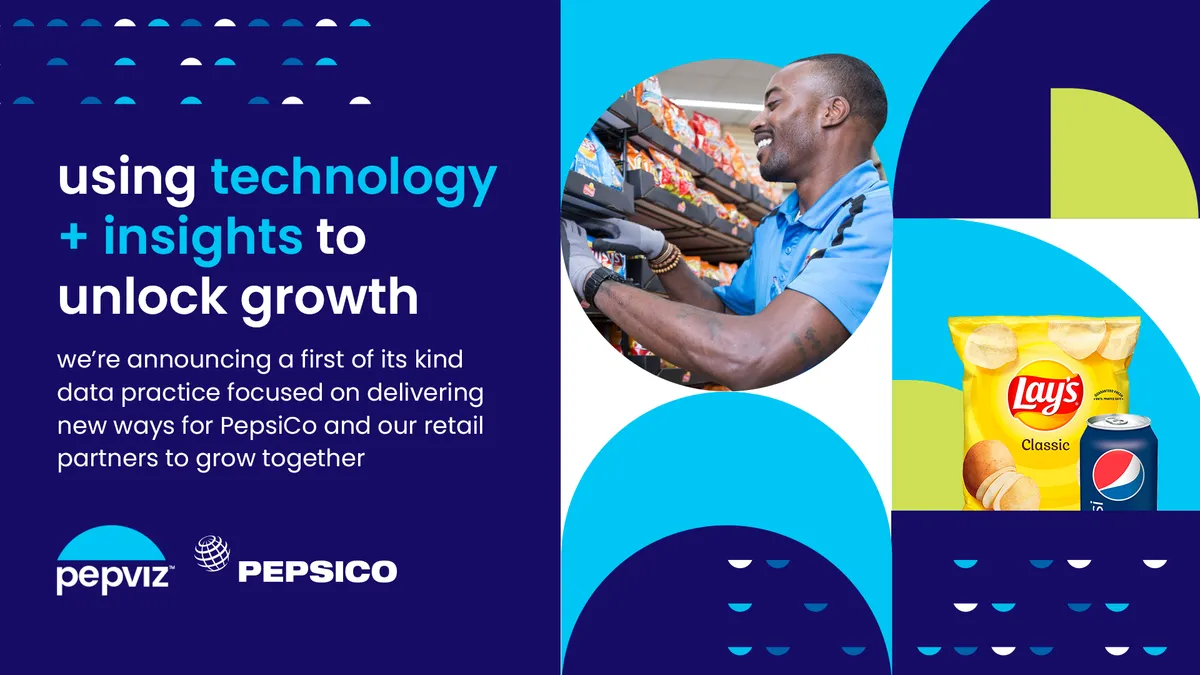As the pandemic accelerates changes in how people shop and what they consume, PepsiCo is harnessing data to help retailers boost sales while increasing demand for its own portfolio of beverages and snacks.
The maker of Cheetos and Mtn Dew is launching Pepviz, a platform that offers retailers analytics, data science and other tools to attract new shoppers, drive store trips and boost loyalty, encourage impulse buys, improve product mix and increase sales both in store and online.
Through Pepviz, the New York-based CPG can harness retail and shopper data to better cater to the needs of the consumer that sometimes can vary from store to store. The collection of data also can play a major role in helping retailers optimize their limited shelf space and solve other problems.
PepsiCo is considering how the company and the retailers it works with can move forward after the pandemic, said Kate Garner, a senior vice president at the company. "We've seen a lot of agility, new questions for our retailers and for ourselves in terms of how to predict and capture growth with significant change in the marketplace," she said.
The food landscape is being hit on a number of fronts, leaving CPGs to look for ways to become more nimble and responsive to the needs of both shoppers and retailers. Consumers are not only looking to eat healthier but they are also purchasing more of their groceries online, a pair of trends that have intensified during the ongoing pandemic.
At the same time, food makers and retailers are struggling to answer what the future will look like — how much will people continue to eat at home after COVID-19, for example — leaving them eager for ways to predict where the market is going and how they can win. Increasingly, data is the answer.
Pepviz is currently being used by a "handful of customers" that include both small and large retailers, according to Garner, though she declined to name the companies. Still, she said retailers' desire to save time and money — and the multitude of questions they must answer in a fast-moving environment — will likely spur more of them to use the platform.
"I do see it as a standard course of business," she said. "PepsiCo is a believer in the power of data and the ability for it to help us identify growth areas."
PepsiCo has been aggressively building up its database for the last five years, and regularly uses data in working with retailers. But Pepviz takes that a step further by zeroing in on shopper behavior on a hyperlocal scale, not only telling a retailer what customers are buying at its store, but also what they’re buying at other stores in the area. This data helps retailers understand how to increase basket sizes.
For example, PepsiCo noted how small-format retailers with limited shelf space typically carry the same product assortment. Pepviz took shopper buying patterns and behavior data collected from two national retailers to help a pair of convenience stores figure out how to sort their customers into four categories, with each cluster being assigned its own product mix.
About 80% of the items were the same across these categories, but the remaining 20% could be changed to cater to a specific individual. After customizing its assortment, one c-store chain saw sales of its salty snacks grow $4,000 per store annually, while the other rose nearly $1,300.
In another example, a retailer wanted to grow sales in its salty snacks category. The company offered largely the same product assortment, but hadn't given much thought to carrying PepsiCo's better-for-you snacks like baked chips or Bare Snacks. It wasn't sure if its customers were ready. With Pepviz's data, PepsiCo determined which of the retailer's stores could benefit from these healthier offerings to grow sales.
"We were really pushing that you need to think differently about each of these stores and the propensity of that shopper," Garner said. "It was a low risk because we weren't asking them to change things out across their entire footprint. We could grow at a slow pace and really get them to commit and understand the investment."
















